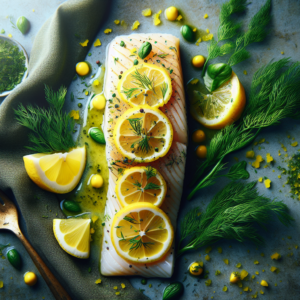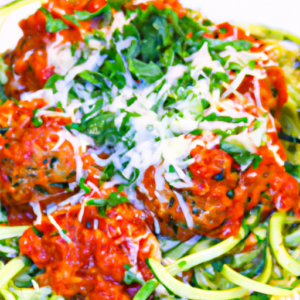Imagine enjoying a delicious and healthy meal that is not only easy to prepare but also fits perfectly into your Paleo diet. Well, look no further! Introducing the Paleo-Friendly Lemon and Dill Baked Cod. This mouthwatering dish combines the vibrant flavors of lemon and dill with tender and flaky cod, resulting in a culinary masterpiece that will leave you wanting more. With its simplicity and wholesome ingredients, this recipe is a must-try for anyone looking to add a burst of freshness to their dinner table. Get ready to tantalize your taste buds and nourish your body with this incredibly tasty Paleo-friendly dish.
Ingredients
Cod fillets
To make the delicious lemon and dill baked cod, you will need fresh cod fillets. Look for fillets that are firm, shiny, and have a mild aroma. Fresh cod fillets are not only tasty but also packed with nutrition, making them a perfect choice for a healthy meal.
Fresh lemon
The fresh and tangy flavor of lemon adds a refreshing twist to this dish. When selecting lemons, choose ones that are firm and have bright yellow skins. Lemons are not only a great source of vitamin C but also add a vibrant zest to the cod fillets.
Fresh dill
Dill is a fragrant herb that pairs perfectly with fish dishes. Its delicate flavor adds a subtle touch of freshness to the baked cod. When choosing fresh dill, look for vibrant green leaves and a strong aroma.
Olive oil
Olive oil is a staple in many Mediterranean dishes, and it adds a rich and savory flavor to the cod fillets. Opt for extra virgin olive oil for its superior taste and health benefits. It contains heart-healthy monounsaturated fats and is a great source of antioxidants.
Garlic
Garlic, with its pungent and aromatic taste, is a fantastic addition to this recipe. It not only enhances the flavors of the cod but also offers various health benefits. Garlic is known for its immune-boosting properties and is rich in antioxidants.
Sea salt
Sea salt is a natural, unrefined alternative to regular table salt. It adds a depth of flavor to the cod fillets while also providing trace minerals that are essential for the body.
Black pepper
Black pepper is a versatile spice that complements the other ingredients in this dish. Its subtle heat and earthy flavor elevate the taste of the cod fillets.
Instructions
Prepare the cod fillets
Start by rinsing the cod fillets under cold water to remove any excess moisture. Pat them dry with a paper towel before proceeding with the recipe. This step ensures that the marinade sticks to the fillets and the fish cooks evenly.
Create the lemon and dill marinade
In a small bowl, whisk together the juice of fresh lemons, finely chopped fresh dill, minced garlic, a drizzle of olive oil, sea salt, and black pepper. The lemon juice adds a tangy citrus flavor, while the dill and garlic infuse the fillets with a delightful aroma.
Marinate the cod fillets
Place the cod fillets in a shallow dish and pour the marinade over them, ensuring they are fully coated. Cover the dish and let the fillets marinate in the refrigerator for at least 30 minutes. This allows the flavors to penetrate the fish and results in a more flavorful dish.
Preheat the oven
While the fillets are marinating, preheat your oven to 375°F (190°C). Preheating the oven ensures that it reaches the desired temperature and cooks the cod fillets evenly.
Bake the cod fillets
Once the oven is preheated, remove the marinated cod fillets from the refrigerator and place them on a baking sheet lined with parchment paper. Bake the fillets for about 15-20 minutes or until they are opaque and flaky. Cooking times may vary depending on the thickness of the fillets, so keep an eye on them to avoid overcooking.
Garnish and serve
Remove the baked cod fillets from the oven and allow them to rest for a few minutes. Garnish them with fresh dill sprigs and a squeeze of lemon juice for an extra burst of flavor. Serve the lemon and dill baked cod with your favorite side dishes or a fresh salad for a complete and satisfying meal.
Tips
Selecting fresh cod fillets
When choosing fresh cod fillets, look for ones that have a firm texture, shiny appearance, and a mild aroma. Avoid fillets that appear slimy or have a strong fishy smell, as these are signs of poor quality.
Choosing the right lemon
To get the best flavor from your lemon, select ones that are firm and have bright yellow skins. Avoid lemons that are soft or have brown spots, as these may indicate an older lemon that has lost some of its freshness and flavor.
Storing leftovers
If you have any leftovers, store them in an airtight container in the refrigerator for up to 2 days. To reheat, place the fillets in a preheated oven at 350°F (175°C) for about 10 minutes or until heated through.
Variations and substitutions
Feel free to get creative with this recipe! You can try using other types of white fish like haddock or halibut instead of cod. Additionally, if you don’t have fresh dill on hand, you can substitute it with dried dill, though the flavor may not be as pronounced.
Health Benefits
High in protein
Cod fillets are an excellent source of protein, making them a great choice for those following a high-protein diet or looking to increase their protein intake. Protein is essential for building and repairing tissues and plays a key role in many bodily functions.
Rich in omega-3 fatty acids
Cod is a good source of omega-3 fatty acids, which are beneficial for heart health and brain function. Omega-3 fatty acids have been linked to a reduced risk of heart disease and may help improve cognitive function.
Packed with vitamins and minerals
Cod fillets are packed with vitamins and minerals, including vitamin B12, vitamin D, selenium, and phosphorus. Vitamin B12 is important for maintaining nerve health, while vitamin D is essential for strong bones. Selenium and phosphorus play crucial roles in various bodily processes.
FAQs
Can I use frozen cod fillets?
Yes, you can use frozen cod fillets for this recipe. Just make sure to thaw the fillets completely before marinating and baking them. Thawing them in the refrigerator overnight is the best method to preserve their flavor and texture.
Can I use dried dill instead of fresh?
While fresh dill offers a more vibrant flavor, you can use dried dill as a substitute. Keep in mind that the flavor may be less intense, so you may need to adjust the amount accordingly. As a general rule, use 1 teaspoon of dried dill for every tablespoon of fresh dill called for in the recipe.
Can I use other types of white fish?
Absolutely! This recipe works well with various types of white fish, such as haddock, halibut, or even tilapia. Feel free to experiment and find your favorite combination.
How can I make the dish more flavorful?
If you want to make the dish more flavorful, you can add additional herbs and spices to the marinade. Some great options include paprika, thyme, or even a pinch of chili flakes for a touch of heat. Don’t be afraid to get creative and explore different flavor profiles to suit your taste.
Conclusion
The Paleo-Friendly Lemon and Dill Baked Cod is a delicious and nutritious dish that combines fresh flavors with the health benefits of cod fillets. With the tangy citrus of lemon, the fragrant aroma of dill, and the richness of olive oil, this recipe is sure to impress your taste buds. Whether you follow a paleo diet or simply enjoy a flavorful and healthy meal, this lemon and dill baked cod is a fantastic choice. So go ahead, grab your ingredients, and get cooking!



